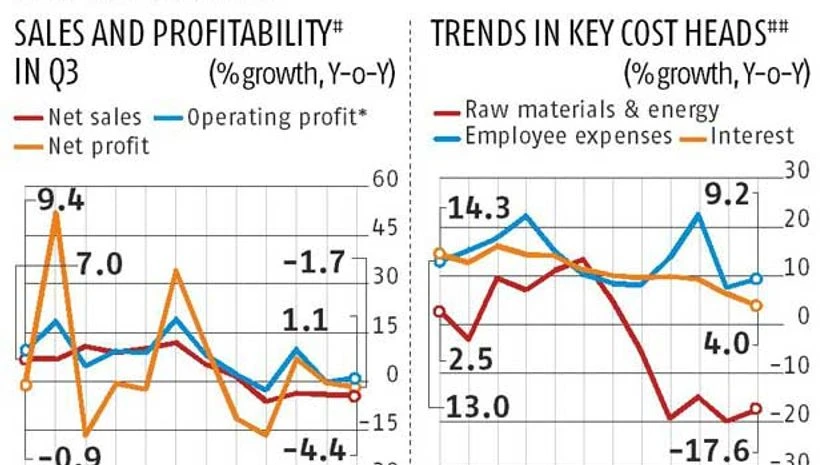India Inc and equity investors might have to wait longer for a recovery in corporate growth and earnings. During the October-December quarter of this financial year, the combined net sales of 2,561 companies declined 4.4 per cent on a year-on-year basis, a higher rate than 4.3 per cent in the September quarter and 3.6 per cent in the June quarter. Operating profit rose 1.1 per cent, aided by lower costs amid a slide in global commodity and energy prices, while net profit declined 1.7 per cent.
If financial and energy firms are removed from the sample, the picture improves a little. The remaining 2,100 companies reported net profit growth of 3.3 per cent from a year earlier, on lower tax outgo, while net sales remained stagnant, rising only 0.7 per cent on a year-on-year basis.
Several public-sector banks reported losses in the quarter, and the energy companies suffered due to lower crude oil prices.

Raw material and energy intensity declined to the lowest in four years and companies continued to make gains from record low prices of industrial commodities and energy. For the 2,100 non-financial, non-energy companies, every Rs 100 worth of net sales required Rs 36.9 worth of raw materials, power and fuel in the December quarter, compared with Rs 37.3 in the previous quarter and Rs 39.7 in the corresponding quarter the previous year.
As a result, the operating profit margin (excluding other income) increased 20 basis points from a year earlier, and 60 basis points from the previous quarter, to stand at 14.3 per cent of net sales.
One basis point is a hundredth of a percentage point. The profitability would have been higher if not for employee expenses and other costs, which seemed to be eating into the gains from lower input costs. "There has been a steady rise in non-input costs as companies have scaled up their sales and marketing efforts. This might hit margins if commodity prices rise in the future or a recovery in growth is delayed further," says Dhananjay Sinha, head (institutional equity), Emkay Global Financial Services.
The total employee costs of these companies grew 8.6 per cent during the quarter, compared with 8.1 per cent in the corresponding quarter the previous year. Employee expenses as a percentage of net sales were 12.34 per cent in the December quarter, up 90 basis points on a year-on-year basis, and nine basis points sequentially. The analysis excludes the figures for the June 2015 quarter, when employee expenses had shot up due to a one-time special bonus payment by Tata Consultancy Services. Sales, marketing and other costs in the December quarter rose 100 basis points from a year earlier and 20 basis points from the previous quarter.
The bottom line was also aided by a sharp decline in direct tax outgo during the quarter, as companies in many sectors paid lower corporate income tax or claimed refunds due to a progressive deterioration in profitability. Combined tax outgo for the companies in the sample was down 13.2 per cent on a year-on-year basis, leading to a 330-basis-point decline in the effective tax rate from a year earlier. The companies paid 29.7 per cent of their profit before taxes as corporate income tax in the quarter, compared with 33 per cent a year earlier. On the brighter side, the numbers for the December quarter also suggest that some deleveraging is taking place, with interest expenses growing at the slowest pace in at least three years.

The combined interest outgo was up only four per cent on a year-on-year basis, down from 9.6 per cent a year earlier and six per cent in the previous quarter. The interest coverage ratio deteriorated marginally, thanks to flat earnings before interest, tax, depreciation and amortisation (Ebitda).
Analysts attribute this to a combination of declining working capital borrowings and a deflationary impact on the top line.
Among key sectors, power, software services, pharmaceuticals and automobile were the biggest contributors to corporate profitability and growth during the quarter. The biggest laggards were metals & mining, construction, infrastructure and capital goods players.
Now, all hopes are pinned to an uptick in urban consumption, thanks to the 7th Pay Commission awards and an expected pump-priming by the government in the coming Union Budget.

)
